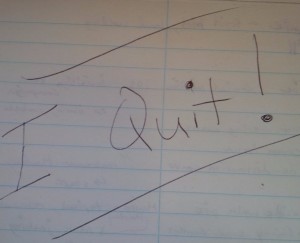 History is rife with example of people whose greatest success came after their biggest failure.
History is rife with example of people whose greatest success came after their biggest failure.
In Think and Grow Rich, Napoleon Hill tells the story of a young man during the Gold Rush. He went west to find his fortune. He staked a claim and went to work.
And he worked…and worked…and worked. No reward.
But then he finally discovered gold! He quickly raised the money to buy the equipment he needed to mine it.
He started drilling, but then the vein disappeared. He kept drilling, but to no avail.
Disappointment turned to discouragement. The quit hit the plan. He went back home, still a poor man.
Hill notes it was later discovered that the young man had stopped just three feet short of one of the richest deposits of gold in the United States.
Almost all entrepreneurs experience it at some point – the quit hits the plan. It’s a passing thought that can become pervasive.
How can you fight it? How do you know when you should give in to it?
These are tough questions. In the end, only you can answer them. Here are five tips from our own experiences and those of people we’ve worked with.
1) Be stubborn
While stubbornness is looked down upon, a certain amount of it – applied to the right things in the right way – is a necessary ingredient of success.
You’ve done your research. You have insights that others may not. You have a unique perspective based on your education and experiences.
What made you think your idea was a good one? What made you think you could build a business of substance?
Remind yourself of these things. Stay confident. Trust your instincts and push on!
2) Keep setbacks in perspective
Thomas Edison, the great inventor, obtained over 1,000 patents in his lifetime. But it took him about 10,000 tries to finally invent the light bulb.
He realized that success results from eliminating possibilities. He eliminated one possibility with every attempt. He was then free to try something different.
If at first you don’t succeed, try 10,000 times again!
3) Nourish your spirit
Entrepreneurship is an emotional experience. It’s a mental game. You need to be logical. But you also have to keep your emotions on your side.
Because they can run rampant and bring you down if left on their own. And you know what happens then – the quit hits the plan.
Different people have different ways of keeping their spirit up. Find what works for you. You may:
- read success stories
- build a support network
- get a good night’s sleep
- take a nap
- exercise
There are many more possibilities. Choose one or more. Then schedule time for them so you keep pushing, no matter what obstacles may come your way.
4) Don’t let it affect your health
As an entrepreneur, you will feel a level of stress at time that few people ever experience. You need to push on, unless it’s affecting your long-term health. Nothing is worth that.
You may be having anxiety attacks, experiencing constant stress, feeling burned out or fatigued. These are indicators that it may be time to let the quit hit the plan.
5) Get help
We consulted with a startup entrepreneur. He was so down. You could see it instantly in his body language. He was slouched over. He moved slowly. Frankly, he looked terrible.
He had missed his self-imposed milestones. He was working daylight to dark and beyond. He was exhausted – physically, mentally and emotionally.
As you might imagine, he was ready to quit.
“I just feel so isolated,” he said.
We listened to him. We assured him that we knew how he felt because we’d lived though it ourselves.
Then with a combination of encouragement and business advice, we helped him feel better and get focused on his next step so he didn’t feel overwhelmed by all the steps he needed to take.
Now he has a spring in his step. He’s moving forward and growing his business.
Like this entrepreneur, there will be times when it’s tempting to quit. You’ll be down. You’ll be out. You’ll feel horribly discouraged. You may have a sense of despair.
In those moments, find someone you can talk with. Someone who understands. Someone who’s been there, done that.
Weak people are scared to ask for help. They think it will make them look weak. But it’s the opposite. Only the strong ask for help. And they get it. It’s one of the reasons only the strong survive!
What do you do when the quit hits the fan?

